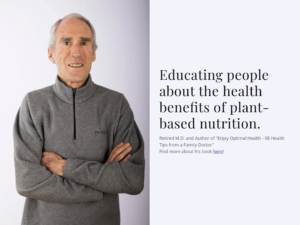 THE ENDOTHELIAL ORGAN SYSTEM AND COVID-19
THE ENDOTHELIAL ORGAN SYSTEM AND COVID-19
Health column by Dr. Greg Feinsinger. Champion of Whole Food Plant Based Living and righteous person.
The endothelium is an organ, one cell thick, that lines our miles and miles of arteries. A healthy endothelium produces nitric oxide, that dilates our arteries and prevents them from forming plaque—the cause of heart attacks and strokes.
According to Dr. William Li, author of “Eat to Beat Disease,” COVID-19 should be thought of as a vascular disease, because the virus attaches to receptors in the endothelium, resulting in destruction of endothelial cells. Dr. Li is president of the Angiogenesis Foundation, through which he does cutting edge research on the formation of new blood vessels—important in injuries and in many diseases. Like many medical scientists, when COVID struck he switched his research to combating the COVID virus. He presented an interesting talk about his COVID research at last month’s virtual annual Conference on Plant-Based Nutrition.
Following are some conditions caused by COVID’s harm to endothelial cells:
- COVID toe, in which the toes become red, swollen, tender, and painful
- loss of sense of smell and taste, due to damage to the endothelium of the olfactory organ in the nose
- heart damage, which in one study occurred in 78 percent of people who contracted mild COVID disease, and which in another study caused autopsy evidence of heart damage in 61 percent of people who died from COVID lung disease
- The most extensive damage occurs to blood vessels in the lungs, which often doesn’t resolve in the rare person who survives severe COVID lung disease
Some people, including some of our leaders, are cavalier about COVID, even though it has killed over 200,000 Americans. Just because some people recover from it, doesn’t mean that they recover completely. Dr. Li feels that in addition to the predicted second wave of COVID illness as the weather gets colder and people spend more time together inside, there will be another wave of illness caused by chronic vascular damage. Even now, we know that many people who survived even mild COVID disease still don’t feel normal months later.
Dr. Li notes that what keeps the endothelium healthy is a plant-based, whole food diet, which is the same diet that optimizes our immune system. Of course, the best approach is to avoid the virus, by adhering to public health guidelines. But if you do contract the virus, a healthy immune system can fight it off before it invades your body and becomes serious. Here are some examples of how food can assist in this:
- One of the first lines of defense are IgA antibodies, present in our mucus membranes. A study showed that people who ate mushrooms daily for two weeks increased their IgA antibodies by 144 percent.
- T cells are another type of “soldier” in our immune system, and cranberries have been shown to increase these cells and to decrease symptoms of colds and flu.
- Natural killer (NK) cells are another part of our immune system, and blueberries and blackberries have been shown to increase their numbers.
- Certain bacteria in our gut microbiome are important in increasing other types of “immune soldiers,” and green and black tea promote growth of these health-promoting organisms.
- Broccoli has been shown to amplify the effectiveness of the flu vaccine.
- Kombu, a seaweed often used in Japanese cooking, aids in blocking the attachment of viruses to cells in our bodies.
Leave a Reply